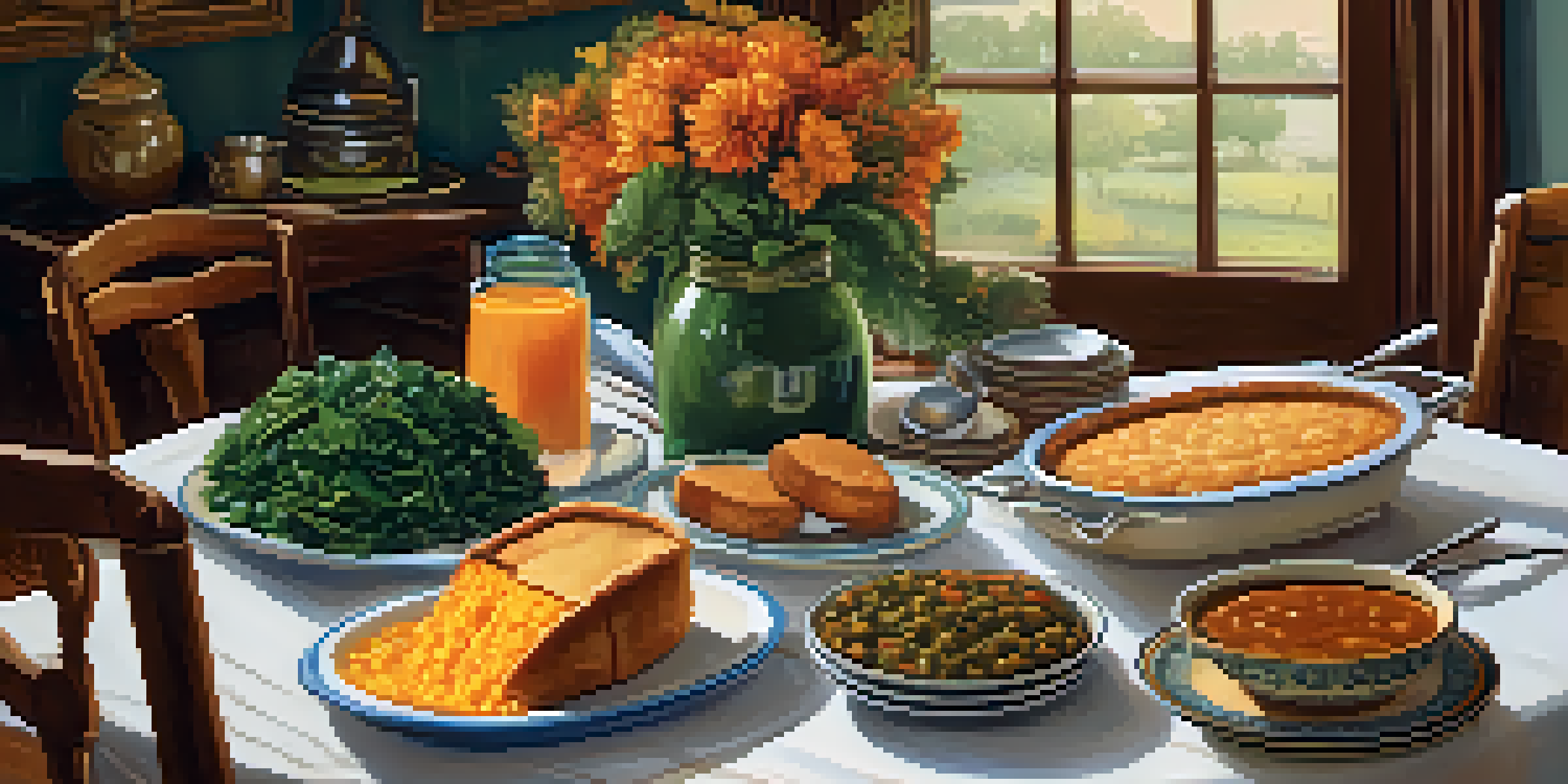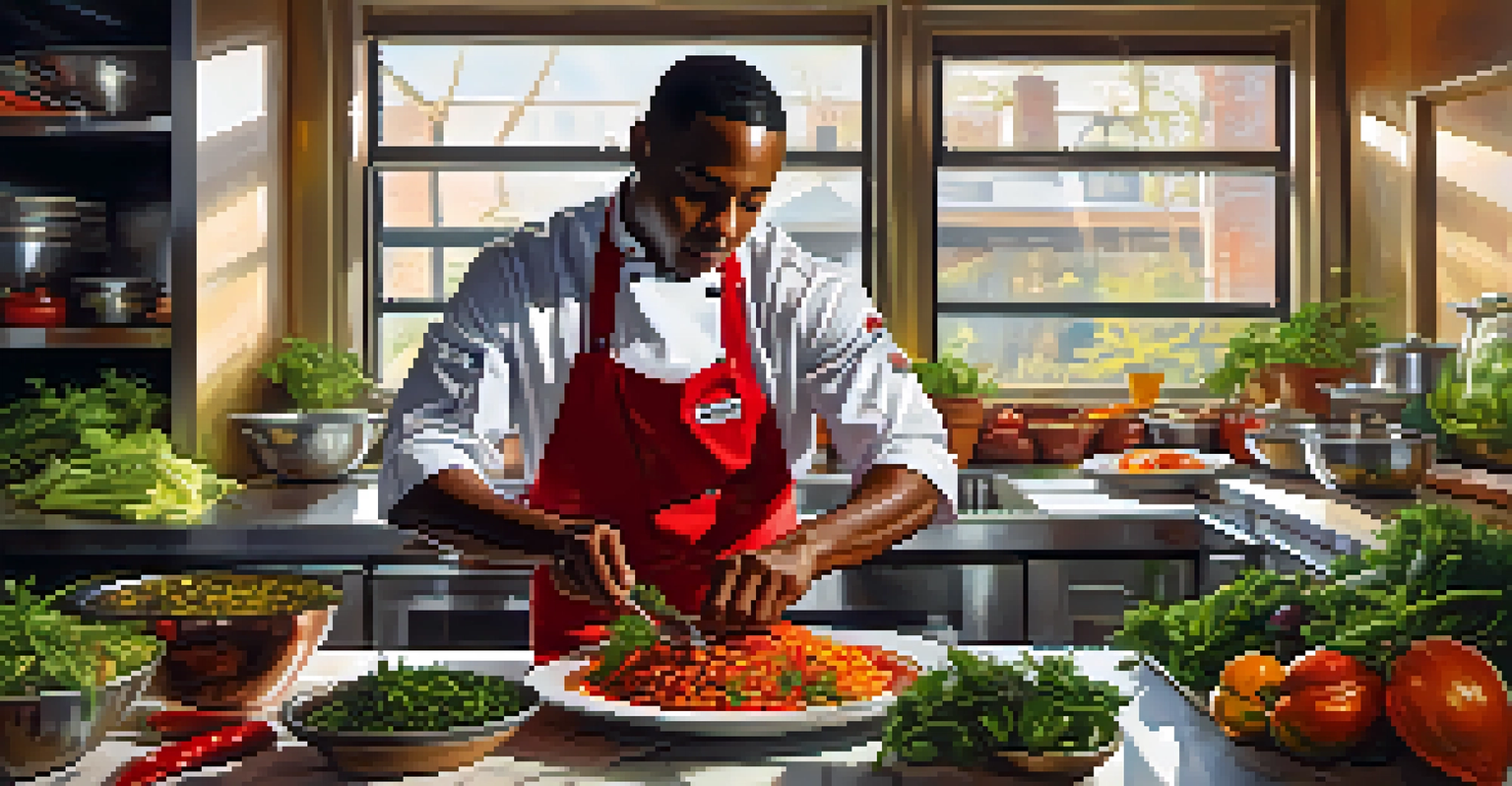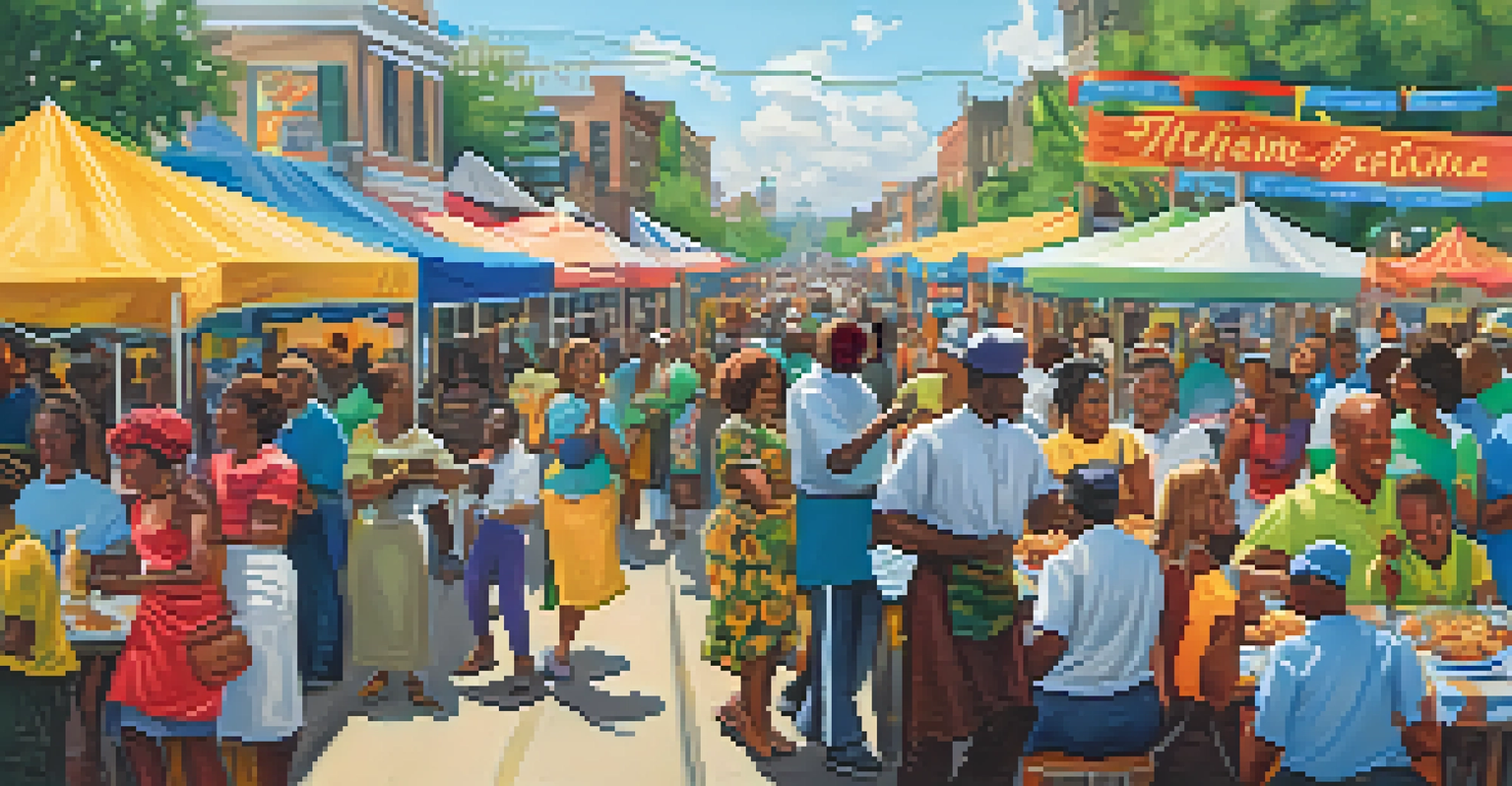Culinary Heritage: The Influence of African American Chefs

Understanding Culinary Heritage and Its Importance
Culinary heritage refers to the traditional practices, recipes, and techniques passed down through generations. It’s not just about food; it's about culture, identity, and community. Understanding culinary heritage allows us to appreciate the diverse influences that shape our dining experiences today.
Food is our common ground, a universal experience.
For African Americans, culinary heritage is deeply intertwined with history, resilience, and creativity. The dishes that have emerged from this heritage reflect a blend of African, European, and Native American influences, creating a unique tapestry of flavors. Recognizing this heritage helps to honor the struggles and triumphs of a community.
As we explore the influence of African American chefs, we uncover stories that connect food with social change, community building, and cultural pride. Their contributions have not only enriched American cuisine but have also laid the groundwork for future generations of chefs and food enthusiasts.
The Roots of African American Culinary Traditions
African American culinary traditions have their roots in the rich agricultural practices of Africa, combined with the harsh realities of slavery in America. Enslaved Africans brought with them a wealth of knowledge about farming and cooking, which adapted over time to include local ingredients and cooking methods. This fusion gave birth to many beloved dishes that we still enjoy today.

Key ingredients such as okra, rice, and black-eyed peas became staples in Southern cuisine, often prepared in ways that reflected African cooking techniques. The use of spices and flavor profiles also showcases the deep connections to various African cultures. These culinary practices were not just about sustenance; they were a means of cultural expression and survival.
Culinary Heritage Shapes Identity
Culinary heritage encompasses traditional practices and recipes that reflect culture, identity, and community.
As these traditions evolved, they were passed down through generations, often through informal gatherings and family meals. The communal aspect of cooking and sharing food remains a cornerstone of African American culture, emphasizing the importance of family and community bonds.
Influential African American Chefs and Their Impact
Throughout history, many African American chefs have made significant contributions to the culinary landscape. Figures like Edna Lewis and Leah Chase have not only perfected traditional Southern dishes but have also elevated them to new heights, gaining recognition and respect in the culinary world. Their passion and dedication have inspired countless others to embrace their culinary heritage.
Cooking is like love. It should be entered into with abandon or not at all.
Edna Lewis, often referred to as the 'Julia Child of Southern cooking,' championed seasonal ingredients and farm-to-table practices long before they became trendy. Her cookbooks celebrate the flavors of the South while emphasizing the importance of preserving these culinary traditions. Leah Chase, known as the 'Queen of Creole Cuisine,' brought the vibrant flavors of New Orleans to the forefront, showcasing the cultural richness of her heritage.
These chefs have opened doors for future generations, proving that African American cuisine is not only delicious but also an essential part of America's culinary story. Their influence continues to inspire new chefs to explore and innovate within these rich traditions.
Modern African American Chefs Shaping the Culinary Scene
Today, a new generation of African American chefs is making waves in the culinary world, bringing fresh perspectives and innovative ideas to the table. Chefs like Kwame Onwuachi and Mashama Bailey are not only crafting exceptional dishes but are also passionate advocates for inclusivity in the culinary industry. Their stories highlight the ongoing evolution of African American cuisine.
Kwame Onwuachi, who has roots in Nigeria and the Caribbean, blends these influences with traditional American dishes, creating a unique culinary identity. His work emphasizes the importance of storytelling through food, showcasing the rich tapestry of influences that shape his cooking. Meanwhile, Mashama Bailey, with her acclaimed restaurant, has worked to bridge the gap between traditional Southern cooking and contemporary fine dining.
Influential Chefs Redefine Cuisine
Prominent African American chefs have transformed traditional dishes, inspiring a new generation in the culinary world.
These chefs are pushing boundaries and redefining what it means to be a chef today. They are not only preserving culinary heritage but also ensuring that it continues to evolve, reflecting the diverse experiences of African Americans in the culinary landscape.
The Role of Culinary Education in Preserving Heritage
Culinary education plays a crucial role in preserving and promoting African American culinary heritage. Institutions and programs that focus on African American cooking traditions offer students the chance to learn techniques, recipes, and cultural stories that are often overlooked in mainstream culinary schools. This education fosters a deeper understanding of the significance behind the food.
Programs like the African American Culinary Heritage Cookbook Project and initiatives within culinary schools help to document and teach these essential skills. They provide opportunities for aspiring chefs to connect with their roots and learn the historical context of the dishes they prepare. This connection to heritage helps to instill pride and a sense of responsibility to carry these traditions forward.
Moreover, these educational programs often emphasize mentorship, creating a supportive community that encourages young chefs to explore their culinary identities. By investing in this education, we ensure that the rich legacy of African American cuisine continues to thrive for generations to come.
Celebrating Culinary Festivals and Events
Culinary festivals and events serve as vibrant platforms to celebrate African American culinary heritage. Events like the New Orleans Jazz & Heritage Festival and the African American Foodways Symposium not only showcase delicious food but also honor the cultural significance behind each dish. These gatherings highlight the importance of community and the shared love for food.
During these festivals, chefs share their unique interpretations of traditional recipes, allowing attendees to experience a wide range of flavors and culinary techniques. It's an opportunity for chefs to tell their stories and for guests to engage with the culture in a meaningful way. These events foster a sense of pride and recognition for African American chefs and their contributions to the culinary landscape.
Education Preserves Culinary Traditions
Culinary education focused on African American traditions fosters a deeper understanding and appreciation of this rich heritage.
Additionally, these festivals often include discussions, panels, and workshops that educate attendees about the historical and cultural contexts of the food being served. By bringing together diverse communities, these events play a vital role in celebrating and preserving culinary heritage while promoting dialogue and understanding.
The Future of African American Culinary Heritage
As we look to the future, the influence of African American chefs and their culinary heritage remains as vital as ever. There is a growing movement to celebrate and elevate these voices in the food industry, ensuring that their stories and contributions are recognized and respected. This shift is essential for fostering a more inclusive culinary landscape.
Emerging chefs are increasingly embracing their heritage, experimenting with flavors and techniques while remaining rooted in tradition. This blend of innovation and respect for the past is paving the way for a new era in African American cuisine, one that honors the rich history while also pushing culinary boundaries.

Ultimately, the future of African American culinary heritage is bright, filled with endless possibilities. As we continue to elevate these voices and stories, we enrich not only our own culinary experiences but also the tapestry of American cuisine as a whole.